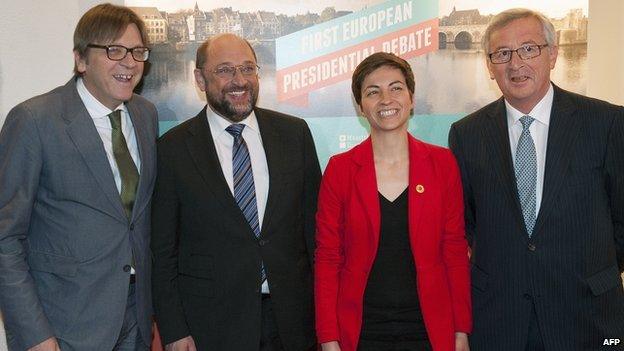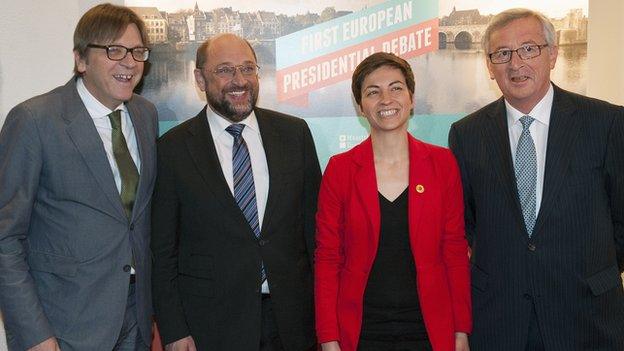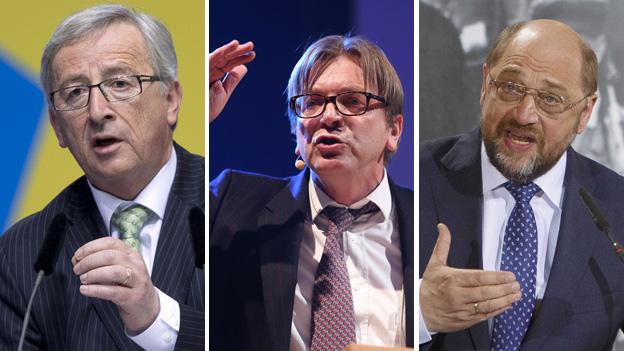Europe's big TV debate
- Published
- comments

Rival candidates (from left) Verhofstadt, Schulz, Keller and Juncker
On Thursday a TV debate in Brussels will be followed in more than 30 European countries.
It will not necessarily be shown on prime outlets, and networks are not shelving high-audience dramas to see five European politicians argue with each other.
No-one is promising TV gold, but this debate, external - and others - is being heralded as a major step towards making Europe and its institutions more democratically accountable.
The politicians, who will take the stage in the European Parliament, are all running to become Europe's next chief executive, President of the European Commission. It is, however, a curious contest. It is fair to say that none of them would turn heads in a Manchester shopping mall.
Aside from their own countries, none of them have much public recognition. And, when it comes down to it, none of them may get the top job.
Yet this contest may be of huge significance to the UK and to David Cameron if he ends up renegotiating Britain's relationship with the EU after 2015.
The European economy dominated the candidates debate, as Gavin Hewitt reports
Political uncertainty
The Lisbon Treaty established that the European Parliament had to be consulted over the next president of the Commission. That has been interpreted by MEPs as meaning that the candidate of the largest political group in the parliament should get the prize of leading the EU.
So the largest parliamentary groups have gone ahead and each selected a candidate - and they have been campaigning across Europe. A battle bus has appeared but, it is fair to say, none of these candidates is filling the piazzas and squares.
What gives the whole campaign a touch of unreality is the fact that the actual choice to lead the Commission will be made by the heads of government - and they may choose the candidate of the strongest party, but they may not, and there may be months of arguing and horse-trading.
Influence on UK
So whoever ends up as president of the European Commission could be sitting in Brussels at a key moment for Britain.
The lead candidates are high priests of the European project, steeped in the ways of Brussels and the politics of Europe. If they are successful they could end up handling a major challenge to the EU - a possible British exit. So we asked four of them about their approach to the EU.
All of them recognise the importance to the EU of continued British membership. All of them are open to negotiations with the UK and all of them believe progress can be made.
How the European Commission works
The polls indicate a narrow win for the Conservative European People's Party (EPP). Its candidate is Jean-Claude Juncker, a former prime minister of Luxembourg.
"I am open to listening to British concerns," he says, and ''I am ready to engage in a dialogue with David Cameron to negotiate a fair deal with Britain".
He says "the other EU countries will have to accept that the UK will never participate in the euro, even if we may regret this".
He sees some flexibility: "ever closer union can mean different things for different states." But the flexibility he has in mind revolves around the protocol which sets out the powers of national parliaments in relation to EU decision-making.
"If there is a significant number of parliaments that oppose a new initiative," he says, "I believe that the EU institutions have to take that extremely seriously."
Against opt-outs
His main opponent is Martin Schulz, a German politician and candidate for the Socialists and Democrats (S&D). He, too, offers to consider very carefully the UK's proposals, whatever they might be.
"My Commission," he says, "would only propose things which have passed a simple test - can these things be done better at European than at national, regional or local level?"
He is open to reform but, like the other candidates, he does not favour "more opt-outs for one country". He is not in favour of treaty change, for the moment, which would give David Cameron the platform to negotiate. But Martin Schulz is clear that "the UK outside Europe would be bad for Europe and bad for Britain".
The third largest party is the Alliance of Liberals and Democrats (ALDE). It is led by a former Belgian prime minister, Guy Verhofstadt, who openly campaigns for a United States of Europe. He recognises that as the eurozone integrates more closely it will be important to "safeguard the influence of the UK... in the single market".
That is a key objective for David Cameron. However, Mr Verhofstadt warns of stiff opposition if Britain tried to "cherry-pick the rules of the single market". Again he is open to the possibility that some competences could be returned to the national level, as long as it happened for all EU countries.
He also suggests that the UK uses more effectively the power to join with other national parliaments to block EU legislation. He, too, says that "if Britain were to leave, both the UK and the EU would be greatly diminished".
More local decisions
The candidate for the Greens is Ska Keller. "The priority," she says, is "to reform Europe rather than to negotiate the relationship between the EU and the UK". That is a widely-held view. Like the others, she believes that more can be done at the local level.
"There are indeed many issues that are better tackled at a regional or local level, closer to the citizens," she says. "We must take full account of the principle of subsidiarity." She suspects that David Cameron's call for treaty change is aimed at transforming the EU into "a sheer free-market area". She also concedes that a British exit from the EU would damage the EU and Europe would lose "the fabulous British wit".
None of these four politicians may actually become Commission president. Certainly the main contest seems to be between Mr Juncker and Mr Schulz, but deals may be done and other names could surface. Both men know that David Cameron eyes them suspiciously as "federalists" who are determined to deepen European integration. Both candidates are also aware that, post-election, the British prime minister might try to block their candidacy.
Hence the offers to negotiate and the talk of "flexibility" - but both believe the answer to the British problem lies in exploiting the existing rules on subsidiarity - leaving regulations to national parliaments unless they can be carried out better at the European level. The British may well argue that those rules have not stopped Brussels mission creep.
But recognition here - one hears it often now in Brussels - that a British exit from the EU would be as damaging for the European project as for the UK.
- Published29 April 2014

- Published19 May 2014
